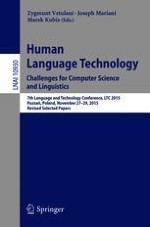2018 | OriginalPaper | Buchkapitel
Exploiting Wikipedia-Based Information-Rich Taxonomy for Extracting Location, Creator and Membership Related Information for ConceptNet Expansion
verfasst von : Marek Krawczyk, Rafal Rzepka, Kenji Araki
Erschienen in: Human Language Technology. Challenges for Computer Science and Linguistics
Aktivieren Sie unsere intelligente Suche, um passende Fachinhalte oder Patente zu finden.
Wählen Sie Textabschnitte aus um mit Künstlicher Intelligenz passenden Patente zu finden. powered by
Markieren Sie Textabschnitte, um KI-gestützt weitere passende Inhalte zu finden. powered by
